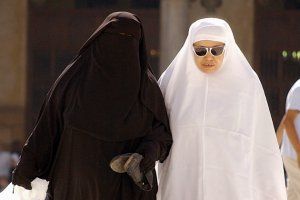
The meaning of the veil for women in Muslim societies has been much debated in the West. Is it, as European backers of its ban would argue, a symbol of repression? Or is it a political statement—a "rejection of the Western lifestyle," as Ayaan Hirsi Ali has written? Two new memoirs by Western women tackle the issue from an insider's vantage point.
In The Butterfly Mosque, 20-something journalist and cartoonist G. Willow Wilson moves from Boston to Cairo, planning to convert to Islam. But she is troubled by the grim state of Egypt's gender relations. "The Middle East is one place for men and an entirely different place for women," she writes. "Almost every man [my friends and I] encountered…watched us with an expression of repressed sexual anger." Then she meets her future husband, Omar—thoughtful, gentle, he's hardly the purity-obsessed, tyrannical Muslim man evoked in arguments against veiling. He doesn't expect Wilson to be a housebound servant, to cover herself, or to refrain from going out in public alone. "This was a matter of principle," writes Wilson. "The Prophet, his role model, never beat or belittled his wives…Omar took that tradition very seriously."
It's not the only time Wilson discovers Quranic tradition to be more female-friendly than secular Westerners might guess. The Quran doesn't limit "the public spaces women can inhabit; nothing prevents them from running businesses or driving cars; there is no reason they must walk behind men or cover their faces," she writes. When Wilson decides to adopt the head-scarf, the choice is about intimacy more than politics—she wants to give Omar "something bigger than anything I've given anyone else"—yet she knows the move will be seen as taking sides. But to her surprise, her moderate Muslim friends don't interpret it as a grand, clash-of-civilizations gesture; "they simply began to greet me with as-salaamu alaykum…[and] the men began to treat me with the same protective chivalry they extended to other Muslim women."
This act of sheltering a woman from predatory men becomes typical of Wilson's interactions once she dons the headscarf. When, for example, her Arabic tutor keeps her safeguarded from visiting male students, it's "a mark of affectionate respect," she explains, "something a brother would do to shield his sister from undignified staring or impolite advances. The more cherished a woman is, the more inaccessible she is made." It's an impulse inextricably linked to Islam's belief that things "most precious, most perfect, and most holy, are always hidden: the Kaaba, the faces of prophets and angels, a woman's body, Heaven." Which raises the possibility that some women choose to veil because it signals to their community that they are valued, cared for, under the protection of a loving family or clan.
While Wilson's book celebrates the sense of belonging that she finds in Islam and in Egyptian culture, Jennifer Steil's memoir, The Woman Who Fell From the Sky, offers the voices of Muslim women torn between familial concerns and individual freedoms. In 2006 Steil—then an editor at The Week magazine—arrived in Yemen to teach a training course at the English--language Observer and ended up running the paper for a year. Her female staff members—and particularly her star reporter, Zuhra—are far from the stereotypical docile doormats that the West often makes Muslim women out to be. Zuhra declares, "I expect never to marry…because I will never compromise my career," and tells Steil, "I wear [the hijab] because I respect myself. And when…beauty is hidden the more important things rise to the surface."
Yet over time, as Steil gets to know her female employees, they vent their frustration with certain cultural practices: the painful tradition of multiple wives; the prohibitions on contact between the sexes; the taboos on premarital sex. Even Zuhra struggles against what she can't do as a woman, such as travel or marry without the consent of her male relatives, or be out reporting after dark. These women may not be agitating to jettison the veil, as France et al. would have them do, but they're aware of what they want to change, and—by working outside the home, reporting on the abuse of women in prisons, traveling abroad for school—they're pushing for personal liberties in their own way.
By the end of the book, Steil and her Yemeni friends have a meeting of the minds. Steil changes her attitude about covering up; when she arrives, she hates feeling unsexy in yards of fabric, then later decides she's "rather taken with this whole modesty thing. Why should I let a man who is not my lover see any part of me?" Meanwhile, Zuhra travels to the U.S., discards the abaya, and discovers that she feels alluring for the first time. After a flurry of compliments and marriage proposals from men, Zuhra e-mails Steil: "I [didn't] realize that I am so attractive to this level. Really I mean it, I thought that I [was] not beautiful." But the veil had been lifted.
Uncommon Knowledge
Newsweek is committed to challenging conventional wisdom and finding connections in the search for common ground.
Newsweek is committed to challenging conventional wisdom and finding connections in the search for common ground.





